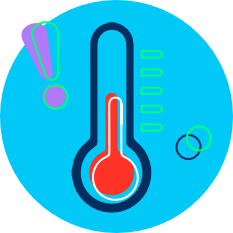
Ideal Bedroom Temperature for Sleep
Bedroom Environment
Creating – and maintaining – the perfect sleep environment is essential in achieving the best possible quality of sleep, which is vital for health and wellbeing. And your bedroom temperature plays a role in that, affecting how well and how long you sleep. Here’s how to create the ideal bedroom temperature.
What temperature should a bedroom be?
Your body heat peaks late afternoon and then starts to drop in the evening to prepare your body for sleep, kickstarting melatonin production. An ideal bedroom temperature is around 16-18°C (60-65°F).
If you’ve ever been too hot or too cold when trying to sleep, you’ll understand how difficult it is to catch some Zzzs. Hot, cold and draughty rooms can seriously impact your sleep, in particular REM (rapid eye movement) sleep. Bedroom temperatures over 24°C (71°F) are likely to cause restlessness, while a cold room of about 12°C (53°F) will make it difficult to drop off.
Best bedroom temperature for young children and elderly people
Young children and elderly people may require a slightly warmer environment, so it’s useful to invest in a room thermometer to keep track of temperatures. It’s also worth purchasing a range of suitable bedding depending on the season – an extra layer of sheets or blankets will make you more comfortable when it’s cold, as will a hot water bottle or a good pair of bed socks for cold feet.
What is a duvet tog rating and which tog rating is best for you?
In the past, choosing a duvet was pretty simple — you’d pick a 4.5 tog duvet for those warm summer nights when you just need a light cover, and a 15 tog duvet for the chilly winter months to keep cozy and warm. But with all the great advancements in duvet technology and the added comfort of central heating, many people now prefer all-season duvets. In Europe, most people tend to go for tog ratings between 10.5 and 13.5. If you’re sharing a bed, a 10.5 tog duvet is a great option. The extra warmth from your partner, along with a toasty room, gives you just the right amount of comfort for a restful night’s sleep.
Sleeping in hot weather or if you are a hot sleeper
Lying in a hot stuffy bedroom won’t lead to a good night’s sleep. But there are lots of simple steps you can take to ensure you stay cool and comfortable and avoid a miserable and restless night in bed.
These include:
- Opening windows to maximise air circulation but keeping curtains/blinds shut to block out the warmth of the sunlight.
- If you’ve got an attic, try opening the hatch. Hot air rises and this will give it somewhere to go.
- Use a lower tog duvet or even a cotton sheet – and wear light cotton nightwear to wick away sweat.
- Stay hydrated by drinking plenty of cold water during the evening and keeping a glass by the bed.
- Fill a hot water bottle with ice-cold water and place it near the feet, or alternatively, cool socks in the fridge – cooling your feet lowers the overall temperature of your skin and body.
- Use an electric fan and if it’s really hot, put a tray of ice and a little water in front of the fan which will cool the air even more.
- If you’ve got long hair, tie it back. Hair around your neck can make you feel warmer.
- If you share a bed, make sure it’s big enough for two people so you can sleep without disturbing each other: 5ft wide should be your minimum.

